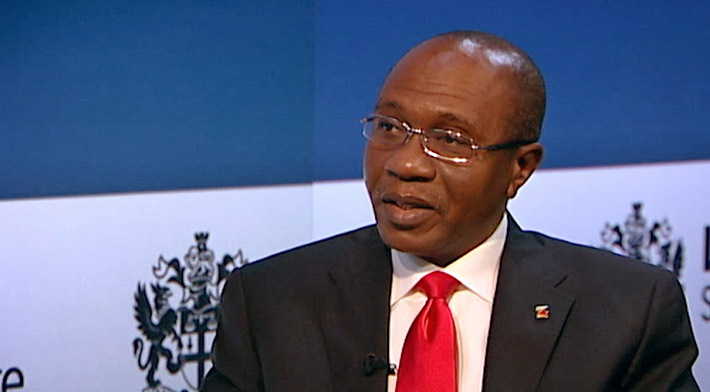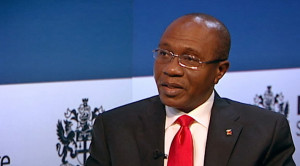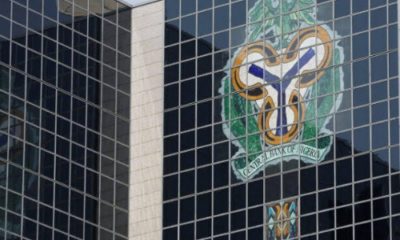Finance
CBN gives insight into why states can’t pay salaries

LAGOS — The dwindling resources of states and local governments suffered a 30.6 per cent fall from federation account allocation in April 2015 when compared with what the states got in the same period last year.
Central Bank of Nigeria, CBN, Economic Report for the month of April said that the total statutory allocation to the state governments stood at N153.45 billion in April 2015. This was 30.6 and 22.9 per cent below the 2014 monthly budget estimate and the level in the preceding month, respectively. The dwindling revenue of federal, state and local government is as a result of falling oil prices.
CBN Governor, Mr Godwin Emefiele Giving insight into the poor financial status of states which depends on monthly federal allocation, the CBN report for April said: “The breakdown showed that at N119.27 billion or 77.7 per cent of the total, state governments’ receipt from the Federation Account was below both the 2014 monthly budget estimate and the level in the preceding month by 29.7 and 30.3 per cent, respectively. “At N34.17 billion or 22.3 per cent of the total, receipts from the VAT Pool Account was below the monthly budget estimate by 33.4 per cent, but exceeded the level in the preceding month by 22.2 per cent. Total receipts by the local governments from the Federation Account and VAT Pool Account stood at N88.91 billion at end-April 2015.
“This was lower than both the budget estimate and the level in the preceding month by 33.8 and 19.7 per cent, respectively. Of this amount, receipts from the Federation Account were N64.99 billion (73.1 per cent of the total), while the VAT Pool Account accounted for N23.92 billion (26.9 per cent of the total). “At N735.07 billion, estimated federally-collected revenue in April 2015, was lower than the monthly budget estimate by 9.8 per cent. It was, however, higher than the receipt in the preceding month by 35.8 per cent.
The decline in estimated federally-collected revenue (gross) relative to the monthly budget estimate was attributable, largely, to the shortfall in receipts from oil revenue during the review month Fall in receipts from crude oil and gas exports “At N286.24 billion or 38.9 per cent of total revenue, gross oil receipt was lower than the monthly budget estimate and the level in the preceding month by 36.8 and 21.5 per cent, respectively. The decline in oil receipts relative to the monthly budget estimate was attributable to the fall in receipts from crude oil and gas exports, occasioned by the drop in the price of crude oil in the international oil market.”
The report further stated that “gross non-oil receipts at N448.83 billion or 61.1 per cent of the total revenue was above the monthly budget estimate and the level in the preceding month by 23.9 and 154.1 per cent, respectively. The increase in non-oil revenue relative to the monthly budget estimate reflected largely, the increased receipts from the FGN Independent Revenue. Distribution among three tiers of govt “It also said that of the gross federally-collected revenue, N307.45 billion (excluding deductions and transfers) was transferred to the Federation Account for distribution among the three tiers of government and the13.0 per cent derivation fund. “The Federal Government received N146.49 billion, while the state and local governments received N74.30 billion and N57.28 billion, respectively.
The balance of N29.38 billion was distributed to the oil-producing states as 13.0% Derivation Fund. From the VAT Pool Account, the Federal Government received N10.25 billion, while the state and local governments received N34.17 billion and N23.92 billion, respectively. In addition, N33.53 billion and N9.49 billion were distributed as Exchange Gain and NNPC Additional Revenue among the three tiers of government and the 13.0 per cent Derivation Fund as follows: “The Federal Government received (N15.37 billion and N4.35 billion), while the state and local governments received (N7.79 billion and N2.21 billion) and (N6.01 billion and N1.70 billion), respectively. The balance (N4.36 billion and N1.23 billion) was distributed to the oil-producing states as 13 per cent Derivation Fund.
“Furthermore, N6.33 billion was received by the Federal Government from the NNPC in respect of the eighth equal installment refund of indebtedness. Overall, the total allocation to the three tiers of government from the Federation Account and VAT Pool Account in the review month amounted to N425.14 billion, compared with N557.80 billion in the preceding month. “At N452.38 billion, the estimated Federal Government retained revenue for April 2015 was above the monthly budget estimate and the receipts in the preceding month by 46.0 and 77.1 per cent, respectively. Of the total amount, the Federation Account accounted for 32.3per cent, while FGN Independent Revenue, others, VAT Pool Accounts, NNPC Refund and NNPC Additional Revenue accounted for 59.6, 3.4, 2.3, 1.4 and 1.0 per cent, respectively.
Total expenditure “At N155.52 billion, total estimated expenditure for April 2015 was lower than both the monthly budget estimate and the level in the preceding month by 60.2 and 26.3 per cent, respectively. A breakdown of total expenditure showed that the recurrent expenditure accounted for 88.8 per cent, while the capital expenditure and transfer components accounted for the balance of 2.8 and 8.4per cent, respectively. Non-debt obligations accounted for 43.7per cent of the total recurrent expenditure, while debt service payments accounted for the balance of 56.3 per cent. Thus, the fiscal operations of the Federal Government resulted in an estimated surplus of N296.86 billion.” According to the CBN “Nigeria’s crude oil production, including condensates and natural gas liquids, was estimated at an average of 1.91million barrels per day (mbd) or 57.30 million barrels for the month. This represented an increase of 5.0 per cent above the level of 1.82 mbd or 56.42 mb recorded in the preceding month. Crude oil export was estimated at 1.46mbd or 43.80 million barrels. This represented an increase of 6.6 per cent above the level recorded in the preceding month.
“Deliveries to the refineries for domestic consumption remained at 0.45 mbd or 13.50 million barrels during the review month. At an estimated average of $59.55per barrel, the price of Nigeria’s reference crude, the Bonny Light (37º API), rose further by 3.7per cent above the level in the preceding month.
“The average prices of other competing crudes, namely the U.K Brent at US$58.18 per barrel; the West Texas Intermediate at $52.82 per barrel; and the Forcados at US$59.88per barrel, also showed similar trends as the Bonny Light. The average price of OPEC’s basket of eleven crude streams, at $55.61per barrel, indicated an increase of 5.7 per cent, but indicated a decline of 46.7 per cent, compared with the average of $52.61and $104.27per barrel recorded in the preceding month and the corresponding period of 2014, respectively “
Vanguard-
Banking
CBN Denies Currency Devaluation

The Central Bank of Nigeria (CBN) has refuted claims of devaluing the.
Earlier reports suggested that the CBN had devalued the Naira, lowering its exchange rate from N631 to the dollar, compared to the previous day’s rate of N461.60 at the Importers and Exporters (I&E) window.
However, the Central Bank of Nigeria (CBN) released a statement on Thursday through its Acting Head of Corporate Communications, Dr. Isa Abdulmumin, categorizing the report as false information.
In the statement titled ‘CBN Has Not Devalued The Naira’, he said the attention of the apex bank was drawn to the news report by an Abuja based newspaper edition of June 1, 2023, titled “CB Devalues Naira To 630/51”.
However, the CBN stated categorically that the news report was replete with outright FALSEHOODS and destabilizing innuendos, ‘reflecting potentially willful ignorance of the said medium as to the workings of the Nigerian Foreign Exchange Market.’
“For the avoidance of doubt, the exchange rate at the Investors’ & Exporters (I&E) window traded this morning (June 1, 2023) at N465/USS1 and has been stable around this rate for a while.
“The public is hereby advised to ignore the news report by Daily Trust in its entirety, as it is speculative and calculated at causing panic in the market,” the CBN spokesman added.
He, therefore, advised media practitioners to verify their facts from the Central Bank of Nigeria before publishing in order not to misinform the public.
Banking
BREAKING: CBN Increases Interest Rate By 0.5%

The interest rate in Nigeria has been raised to 18.5 percent, up by 0.5 percent, from 18 percent where it was pegged in March 2023.
The Central Banks of Nigeria’s (CBN) Monetary Policy Committee (MPC) resolved to this effect at its third meeting of 2023 in Abuja, on Wednesday.
Governor, CBN, Godwin Emefiele, made the disclosure in the communiqué of the MPC’s meeting, thereafter.
While engaging the media at the end of the two-day meeting, Emefiele, said the committee voted to keep the asymmetric corridor at +100 and -700 basis points around the MPR.
In the view of the MPC, rising inflation rate is traceable to the high energy cost and challenges around the supply chain, among others, which lie outside the corridors of the CBN.
Emefiele said, “The current trend in price development would continue to be monitored by the bank with greater collaboration with fiscal authority to address the drivers of inflation.”
Biztellers reports that the CBN had effected six consecutive interest rate increases, which has seen the rate move from 11.5 percent in March 2022 to 18.5 percent in May 2023.
Finance
Dangers Lurk As Nigerians Resort To Refurbished Gas Cylinders

In Nigeria, people have been forced to come up with creative solutions to cope with the effects of inflation and the economic crisis.
These improvised strategies have not only helped individuals save money, but also enabled them to stay afloat during difficult times.
In a concerning development, the recent trend of boycotting the high cost of cooking gas cylinders in Nigeria may pose a greater risk to lives than it does in terms of saving money.
Economy&Lifestyle investigations have revealed that the soaring prices of gas cylinders have reached a point where it has become increasingly challenging for average households to afford them, let alone refill them with gas.
The situation is further exacerbated by the fact that the pump price of kerosene, which would typically serve as an alternative, has become prohibitively expensive.
Upon investigation, it was found that the prices of gas cylinders vary depending on their sizes. A 3kg gas cylinder is priced at N14,000, while a 5kg cylinder costs N16,000. The larger cylinders are even more costly, with a 6kg cylinder priced at N17,000 and a 12.5kg cylinder costing N19,000.
Additionally, the expense continues when it comes to filling these cylinders with cooking gas, as it costs N2,600 for a 3kg cylinder, N5,200 for a 6kg cylinder, N8,950 for a 10.5kg cylinder, and N10,650 for a 12.5kg cylinder.
Consequently, an average household that needs to replace a worn-out 5kg cylinder would have to come up with N20,250 to purchase a new cylinder and fill it with gas, which can be a difficult feat to achieve.
As a result, many people have resorted to refurbishing their old cylinders and trying to use them as best as they can. However, this approach poses a significant danger.
Mrs. Rukayat Adesoji, a trader, shared her experience regarding her gas cylinder, which had become rusted and could no longer stand upright since last month. Due to the exorbitant prices of purchasing new cylinders, she resorted to seeking the assistance of a welder.
The welder patched the legs of the cylinder, repainted it, and ever since then, she has been using the refurbished cylinder for her cooking needs.
She said ““My gas cylinder which was 6kg got rusted and no longer stands erect since last month. When I asked for the price, I was told it was N17, 500. I was discussing it with a friend who advised me to take it to a welder to paint it and construct a new stand. I heeded to her advice and at the end spent just N3, 000 to turn my cooking gas to a brand new.”
Apart from refurbishing cylinders, some people don’t even know when their cylinders will expire. Mrs. Mercy Opara, a hair stylist, falls in that category as she explained: “I am taking my gas cylinder to the welder to spray it for me. It just cost N1, 500.
“The cost of buying a new cylinder is high. I have been using my cylinder for over 7 years and I don’t even know the expiry date. I just pray God blesses me so that I can buy a new one. But this one I am managing will look neat after spraying it for another two years.”
Mr. Adekanbi Joseph, a wielder, said he paints cylinder and “To paint and rebuild a cylinder stand, I charge N4, 500. Many people come here to paint as a new cylinder is now very expensive to get.”
Highlighting the potential dangers of using refurbished cylinders, Mr. Benjamin Hope, the Chief Executive Officer of FKT Cooking gas and general goods, emphasized the risks involved.
He stated that even a brand new cylinder can pose a risk of explosion if the locks are not properly secured after use or if the cylinder filled with gas is moved from one location to another.
He said “A brand new cylinder can explode if the locks are not well keyed after using and if the cylinder filled with gas was moved from one place.
“There are many reasons for the high cost of gas cylinders in Nigeria. One is the cost of importation due to the exchange rate. Another is the increased migration from the use of kerosene to cooking gas which has necessitated increased demand for gas cylinders. You know that in such a case there will be increased importation of cylinders.”he added























